I may have told this story once or twice somewhere before that on my honeymoon in August 2014 my wife pretended that some Notre Dame football players were suspended after I got out of the shower. We were completely off the grid for a week with no cell phones and television full of local news, weather, and lots of cricket. Therefore, I knew she was kidding but I didn’t think it was funny.
Literally, within hours back in the States news would be breaking that Notre Dame was holding out 4 players (a 5th would be added later) from practice in an academic scandal that would become known as the “Frozen Five.” Back in the days before our writers used Slack to communicate I returned to JFK airport on August 19th with nearly 1,000 emails in my inbox.
Three and a half years and nearly 1,200 days following the initial breaking news the NCAA dismissed Notre Dame’s appeal and upheld the vacating of wins (21 in total) from the 2012-13 seasons, in addition to the prior announced year of probation (ended this past November) and $5,000 fine. As with many cases that take years to unfold the way in which we arrived at this outcome colors our perception.
Confusion and a lack of clarity on what actually happened was immediate. Several sources claimed the damage would be minimal, there’d be minor suspensions, and it’d all be over soon. On the other spectrum, South Bend Tribune beat writer Eric Hansen claimed (though he later regretted it) the scandal would rival the University of North Carolina’s in scope and embarrassment. Adding more fuel to the fire of frustration was the fact that the investigation took so long to finish.
So what actually happened?
In the most simple terms, a student athletic trainer committed academic misconduct by partially or wholly completing assignments over multiple courses for a period of 2 years. Beyond this the whole investigation gets extremely convoluted.
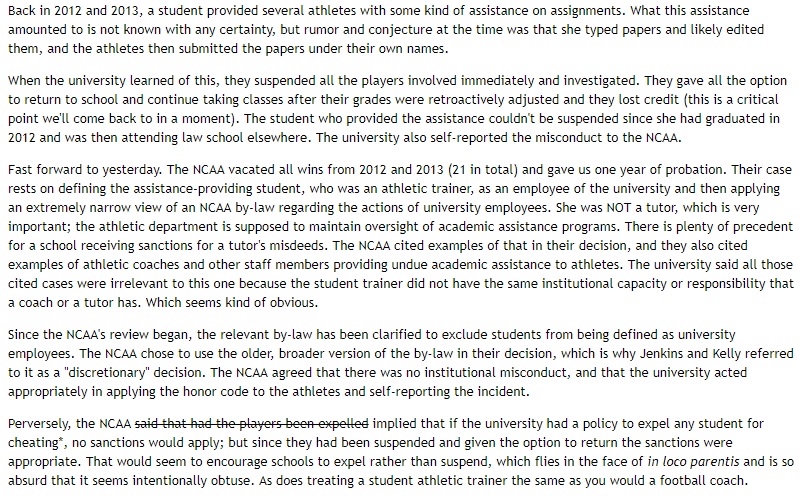
Summary from our writer Brendan
In the world of athletic cheating this whole saga was very small potatoes, Notre Dame tried to handle this in an open manner, and the NCAA still dropped the hammer (relative to the small potatoes misconduct). SMU had the entire 1998 season vacated because a defensive line coach paid to have someone take the ACT for a recruit. 22 athletes received $22,000 in a textbook scandal over a 3-year period at Alabama which brought about vacated football victories. Syracuse had to vacate a few years of wins over a whole set of egregious penalties that went beyond academics, and which also hit Orange basketball much harder.
Notre Dame receiving similar penalties feels intensely wrong.
Unfortunately, the University is learning a harsh lesson, one in which they should’ve known already: Don’t trust the NCAA or give them a hammer to hit you with at any point. I think we can all admit that even at Notre Dame student-athletics can get muddied and at certain times you have to balance your hand against your wrist. The school found out about the academic misconduct, punished the offending players, and that should’ve been the end of it.
Instead, they self-reported the incident(s), went through a thorough deep-dive, invited the NCAA to review things, foolishly said they’d vacate wins if needed, then got really upset when the NCAA vacated wins! In the middle of the investigation you had talk on ESPN about Notre Dame “selling its soul for football glory” over this saga.
A good rule of thumb is to use common sense and avoid self-righteousness. You don’t need self-righteousness in the face of the NCAA and you definitely don’t need to arm your own fans with it when you set a new precedent for academic cheating investigating. By the way, being satisfied with this NCAA ruling is akin to agreeing with the penalty at the end of the 2014 Florida State game. Bless your heart if that’s your gig.
The funny thing is after Notre Dame lost its appeal the outrage against the NCAA was deafening, particularly from the major media. That should give Notre Dame some solace as should President Jenkins’ letter responding to the failed appeal also receiving applause. However, it’s important to remember these are far more about others being incredibly anti-NCAA especially in the face of their North Carolina decision this past October. Let’s not pretend this is ultimately solidarity for Notre Dame.
The lesson from all of this is to be smarter, from the athlete’s decision making with coursework to the university’s response and explicit trust that the NCAA will do the right thing.
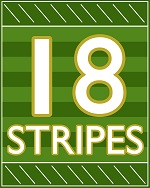
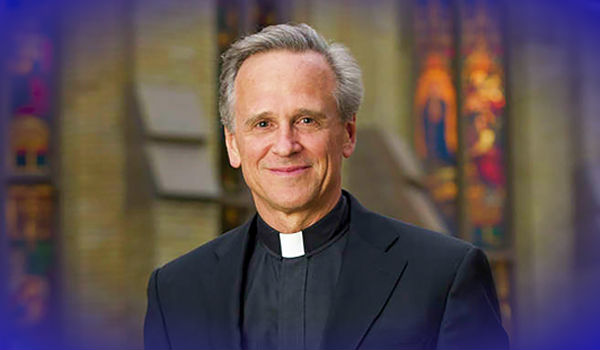

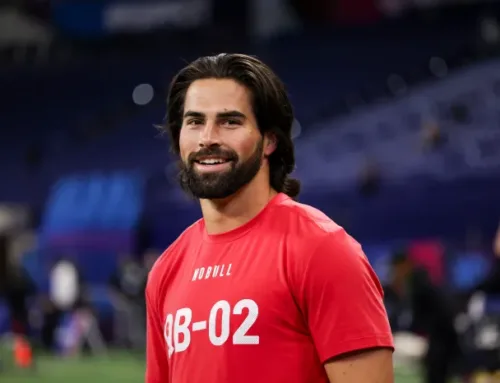
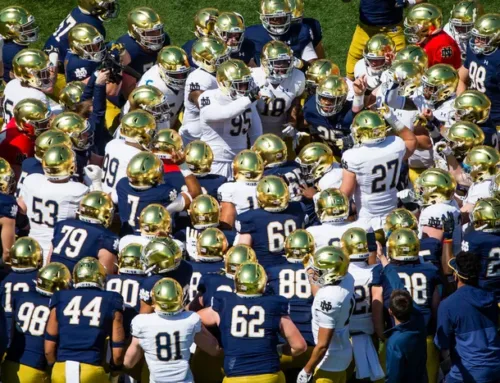
Totally agree. I’ve said this before, but the major mistake was ND wanting to play by the NCAA’s rules, and wanting it hard. I can’t imagine their legal advice was anything but “do not cooperate with the NCAA”, but Jenkins and Swarbrick’s instincts on this went the other way and were *terrible*.
Here’s where I’ll get into perhaps unfair speculation, but my suspicion is that each had ulterior motives: Jenkins wanted to Do The Right Thing and also hold up ND as the bastion of amateur athletics, given his prior statements (er, empty threats) about bailing on D1 if players get paid; and Swarbrick’s dream job is probably the NCAA presidency. Funnily enough, the latter now seems entirely out of the question given Jenkins’s statement. But, hey, at least we’re getting props from Mike Greenberg about Doing the Right Thing!
I agree with the fact that this sucks and the NCAA got it absolutely wrong. However, I absolutely disagree with your conclusions about Swarbrick’s motivations and instincts and the insinuation that Jenkins’ motivations and instincts were not as they should have been. As hard to believe as it may be, I truly think that both of them have a goal of doing the right thing at all times and even knowing what the NCAA did, would probably do the same thing if the situation occurred again. You cannot run a school or a program based on what will get you the least amount of punishment and still be able to hold your head up at the end of the day. You have to do what is right, and if the asinine NCAA hammers you for it, well then that sucks, but too bad. It wasn’t a matter of playing by the NCAA’s rules (unless you think that ND should unilaterally abandon the NCAA). They did what ND’s own rules said they should do. And, they notified the NCAA about what they did. They were likely full aware that by simply kicking the players out of school they would not have incurred any penalty whatsoever, because there would not have been any need to go back and change grades and recalculate GPAs. But, they wanted to offer the players a chance to stay in school and graduate – which I believe some did. It hurt the school, but it was the right thing to do.
As for Swarbrick, what makes you think that his “dream job” is president of the NCAA??? He’s an ND grad and is 63 years old and making a very nice living. Why in the world would he want to take over a thankless job like running the NCAA at this stage in his life? I realize that the NDN nimrods spout that all the time as an insult, but as far as I know, it is completely baseless, other than the fact that those idiots will spout off any rumor, negative comment, or insinuation about anyone involved in ND’s administration, especially their arch enemy, Jack Swarbrick.
I don’t disagree that they did the right thing in terms of letting the kids stay on campus. The dumb Doing The Right Thing thing was involving the NCAA and keeping them apprised about why the kids got punished and what ND was doing about it. So long as college sports is a money maker – which, at this point, it will be – the NCAA is an inherently corrupt organization and should be treated with disdain. However, Jenkins’s (loud wrong) views on amateurism kind of necessitate not viewing the NCAA that way and trying to play by their rules instead of stonewalling. And that, in part, led to the bad result.
That of course doesn’t make the NCAA’s decision *correct*, but it at least arguably does follow from the NCAA’s (absurd) logic.
As to Swarbrick, perhaps I have internalized some of the NDNation chatter, but many of the early articles during his hire trumpeted that he was a finalist for the NCAA presidency before (e.g., http://articles.chicagotribune.com/2008-07-15/sports/0807140682_1_notre-dame-athletics-jack-swarbrick-indiana-sports-corp). At the very least, it was part of the marketing of the hire at the time, so he/ND definitely wanted people to think that he wanted and was eligible for that job. And it’s an inarguably higher-profile gig than even the ND athletic department head, plus it’s in his hometown, etc. Maybe at 63 that ship has sailed, though.
Explain why money makes the NCAA “inherently corrupt”. Is the Federal Reserve Bank inherently corrupt? The SEC? Does money corrupt every regulatory body?
Seems like a lazy statement to me.
I’d argue the SEC is probably more corrupt than the B1G, PAC12 & ACC, but just as corrupt as the B12.
Ha – I meant Securities and Exchange Commission
I was having a laugh
Ha – jokes on me! D’oh!
No, it’s making all the money while using the guise of amateurism to avoid distributing anywhere near the appropriate amount of it to the primary value creators (in most instances, men’s football and basketball players). The NCAA is, at its base, a cartel enforcer.
No matter what one thinks about the government or whatever being rigged – just to reference your example; I don’t want to get into that as, you know, wrong forum, so let’s avoid it – amateur athletics, as enforced by the NCAA, is *definitely* a rigged system.
Are you aware that the NCAA is a non-profit? The revenues are distributed to the schools. In 2017, they had $37mm of administrative expense…salaries, etc. With revenues of close to $1bn that does not strike me as a corrupt burn rate.
http://www.ncaa.org/sites/default/files/2016-17NCAAFin_FinancialStatement_20180129.pdf
Yes, I didn’t say the NCAA is a money maker; I said that college sports is a money maker. The NCAA is the enforcement mechanism upholding the system, which, to my mind, makes it inherently corrupt. Of course the schools benefit from it – that’s how cartels work. They’re the member organizations/beneficiaries.
Of course, that’s also $37M of administrative expenses most of which, in a reasonably free market-ish system, need not exist. So, to my mind, that’s also wasteful, but on a much smaller scale than the overall problems of the system itself (which, again, the NCAA upholds).
Reasonable people disagree about whether revenue athletes should be paid in college. There are solid arguments for both sides of the issue. Just because the current system doesn’t conform to your ideal outcome doesn’t mean it’s corrupt.
When something like this ruling happens, people grab their pitchforks and scream, “Blow up the NCAA!!!” I guarantee you that if that ever happens the actual corruption of money in suitcases, crooked agents, etc will absolutely explode.
The NCAA is not perfect. Rulings like this one are head scratchers. Missing the whole Adidas and others paying athletes is frustrating. However, I would rather have the NCAA calling the shots than conferences.
OK. I tend to think that might be a little too harsh of an assessment on Jenkins, still. I don’t disagree with your premise, but I think, from his perspective, he’s trying to work within the system that exists and do the right thing. The fact that the NCAA snubbed their noses at ND’s attempt is likely what prompted Jenkin’s response, which was pretty strong. I don’t know what ND will do in the future if a similar situation arises, but doing the right thing while at the same time fighting the NCAA tooth and nail might be appropriate.
All of this and the NCAA can only get the bronze medal in most corrupt sports associations behind FIFA and the IOC. That must really stick in their craw.
“By the way, being satisfied with this NCAA ruling is akin to agreeing with the penalty at the end of the 2014 Florida State game. Bless your heart if that’s your gig.”
Wait, is that the official SB Nation position?
I bet you $5 the first draft did not say “bless your heart.”
So, is this over now? I have not seen anything about “next steps”. Are we re-writing the media guides to reflect this decision?
Probably over. There’s always the possibility that the NCAA un-vacates (LOL) the wins who knows. I know in some of the other cases I was looking at a few schools refused to change their records.
I would just refuse. The whole vacating wins thing is sooo stupid. And generally anything attempting to be retroactive is. You can’t actually take those wins away. If you deem something necessary, just punish them going forward.
It’s not like they can actually take away Louisville’s NC. They won the tournament, that happened. The only thing the NCAA does when being retroactively punitive is change the answer to trivia questions.